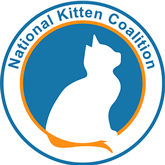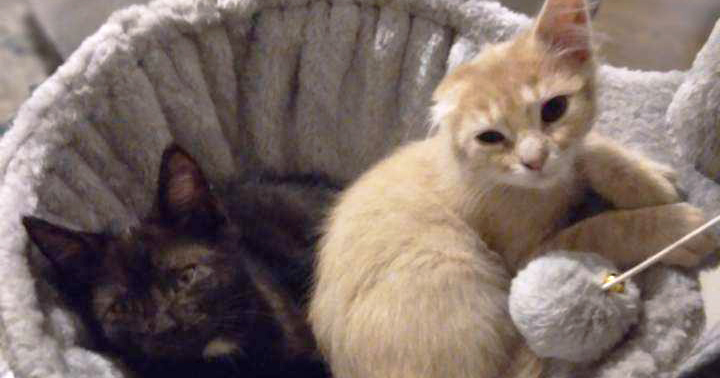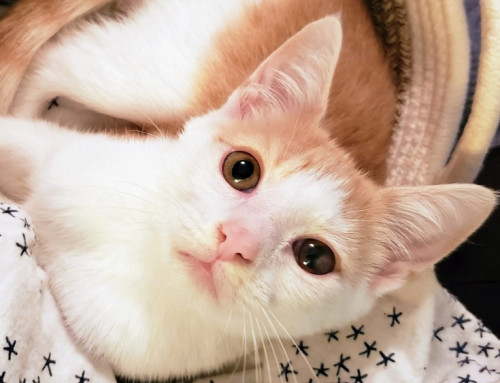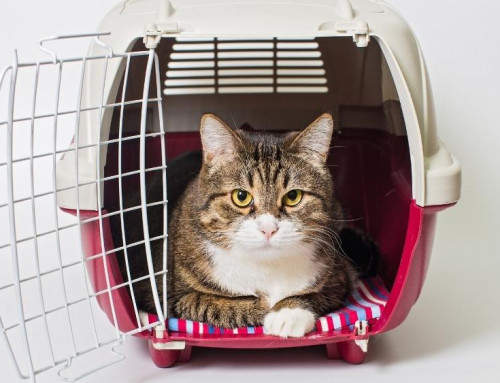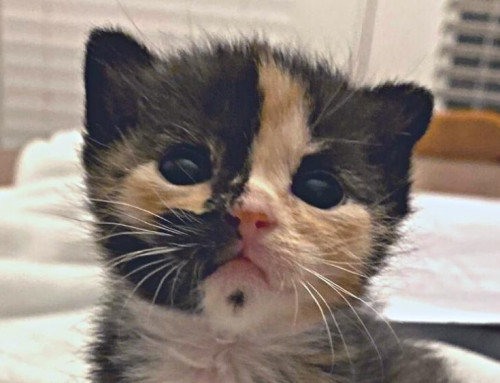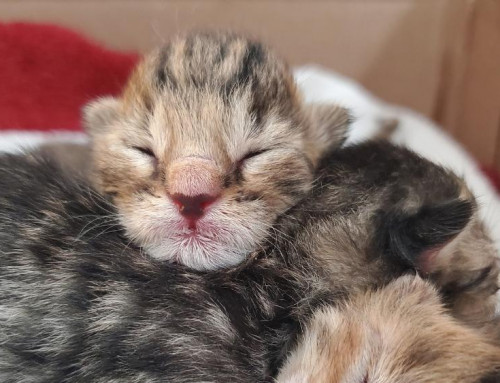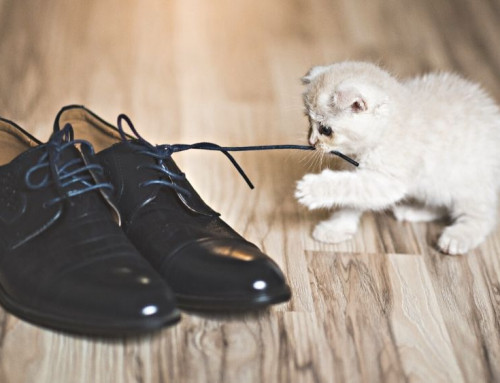Even as a recent graduate from an accelerated veterinary technician school, I didn’t learn much about neonates or pediatrics. Since then, I have gained so much knowledge about kittens from the National Kitten Coalition, which has helped me as a foster and licensed veterinary technician (LVT).
Working as a LVT, I often triage animals over the phone to determine if they require immediate treatment or can wait. Late one night, a good Samaritan called the clinic; he’d found a kitten who fit in the palm of his hand and wasn’t moving. Although we were slammed with appointments, hospitalized patients and drop-off appointments, we asked the man to bring in the kitten He rushed over, and I ran out to the lobby. The kitten was completely limp and emaciated. My heart sank.
We set up oxygen and heat and gave the kitten Karo syrup to boost his blood sugar. Although I’ve seen many catastrophic medical emergencies, each one makes my adrenaline rush. I was choked up just looking at this poor, tiny kitten in such terrible condition, and I wasn’t sure we could save him.
This kitten was about six weeks old and only ¾ pound; he should have weighed 1½ pounds. His temperature was very low, his breathing was labored, his gums were white and he was missing an ear. The well-meaning man had tried feeding milk replacement formula, but the kitten wasn’t stable enough to nurse.
We wrapped the kitten in a warming blanket and kept giving him Karo syrup and oxygen. Thankfully, his temperature and blood sugar eventually improved, and he started to move. We rehydrated him with fluids under the skin, injected an antibiotic and continued to provide minute-by-minute support. The kitten continued to improve. He even made some tiny cries.
The kitten was too critical to transfer to an emergency hospital; and it was unlikely that staff could provide round-the-clock care for such an unstable patient. I was his only chance, so I volunteered to foster him.
I called my husband, who always knows what’s coming when I preface my conversation with “I know it’s late, and we have nowhere to put him, but I need to bring this kitten home.” Of course, he agreed immediately.
I removed the oxygen to see if the kitten could breathe well on his own and went to get additional heat support. When I returned, the kitten was attempting to stand, and his breathing wasn’t labored. I offered some warm, watered-down, bland food and was delighted when he immediately began lapping.
Even though naming a kitten who may die isn’t recommended due to the emotional pain, I decided my little fighter deserved a name. I remembered that while waiting for the birth of my sister’s child, I’d kept saying how I was looking forward to meeting my new nephew, Lil’ Ricky, whenever he joined us. He came early and was in the neonatal ICU. We were able to bring my nephew home thanks to our love, positive thoughts and his excellent medical care.
Because the name Lil’ Ricky gave my nephew luck, I decided to name the kitten Lil’ Ricky. My little emaciated orphan, covered in flea dirt and missing his right ear, needed a name fit for a little fighter.
After he ate, he immediately fell asleep, exhausted. I rushed my precious cargo to the car. On the way home, I pulled over every 15 minutes to make sure Lil’ Ricky was okay. He looked so pathetic.
While my husband was cooing at Lil’ Ricky, I set up an area with blankets, a litter box and heat support — in the basement. My cats would never, ever tolerate a foster on the main floor of the house. He ate a little. I checked Lil’ Ricky’s temperature, gently cleaned dirt, mucus and food from his face, wrapped him in a baby blanket with heat support and held him as he slept in my lap. I kept petting his little head and whispering that he was loved and safe. After the next feeding, I stayed with him as he slept soundly in a heated carrier.
During the night, I checked on him and fed him every 30 to 60 minutes. By the wee hours of the morning, I’d been awake for 22 hours, but he wasn’t moving much again. I gave more Karo syrup to increase his blood sugar and stayed with him to rotate his body from side to side on his heat support. I was utterly exhausted, but fueled by his will to survive. I told him I would do everything I could to help him. After an hour of minute-to-minute care, Lil’ Ricky could finally hold his head up. At that point, I had to go check on my toddler who was upstairs waiting for her breakfast.
It was a powerful struggle to leave my child upstairs while I was attending to the life-and-death needs of a tiny kitten in my basement. After downing caffeine and food, I called my clinic to let them know I was on the way with Lil’ Ricky and, since my husband had left for work, my daughter. I wanted one of the veterinarians to reassess Lil’ Ricky.
My little waif had gained a few ounces; a benchmark that encouraged me. Everyone was surprised he was still alive and thrilled that we could give him a fighting chance. After getting medications for Lil’ Ricky’s conjunctivitis and giving him a Vitamin B-12 injection, we piled into the car for our drive home. After meowing for 20 minutes, Lil’ Ricky fell asleep and looked incredibly peaceful.
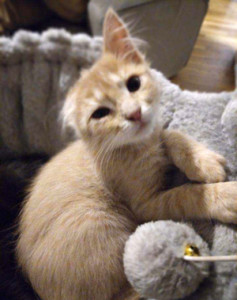
The next few days, Lil’ Ricky continued to improve and gain weight. His temperature remained stable, he no longer needed fluids injected under his skin, and his gums became a lovely light pink color. As any good mother would, I cleaned his little face and bum after every feeding. There were no signs of trauma, and we never did figure out what happened to his ear. If it had been an injury, his ear was now completely healed and healthy.
We were smitten, and my husband wanted to adopt Lil’ Ricky, but I argued that we couldn’t upset our delicate household cat situation. We decided fostering was a great compromise.
Another week went by, and Lil’ Ricky continued to improve. He wanted to play, explore the basement, leave his mark by sneezing on everything and use his tiny little claws to scratch anything he could find. My coworkers, family and I talked about finding a home for Lil’ Ricky.
One of my sisters who lives nearby was interested, and, of course, I was thrilled with the idea of being able to see Lil’ Ricky grow up. She ultimately adopted him, and I get to watch his progress.
I can’t begin to describe how full my heart becomes, as an advocate, teacher, and healer, when my patients (and especially my fosters) heal or survive their health ordeals and are able to be adopted into loving homes. I know that others who foster and adopt feel the same way. This is why I became a LVT and will continue to learn more about saving kittens and helping them thrive from organizations such as the National Kitten Coalition.
